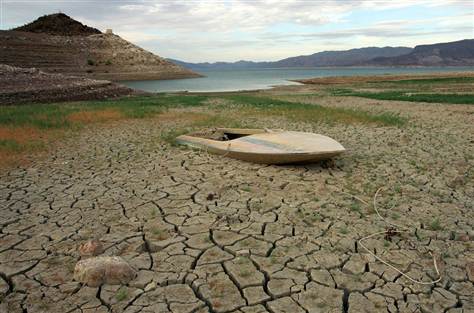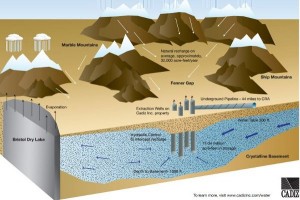Cadiz Plan Highlights Magnitude of California Water Problems

In areas like New England, water isn’t a problem. There are ample river, lakes, and reservoirs, as well as plenty of rain. The water is locally-based and doesn’t need to be piped long distances. There may be occasional droughts, but they don’t last long and generally are of little concern. The water situation in California and the Southwest is, of course, quite different. Droughts can last for years and water supplies frequently come from hundreds of miles away. Cadiz Inc. of Los Angeles is proposing an ambitious, controversial water transfer and storage plan that, regardless of its advantages or problems, demonstrates the seriousness of California’s water problem.
Cadiz, CA is located in a desert area north of Joshua Tree National Park and east of the Marine Corps Twentynine Palms base. Phase 1 of their plan is to grab rain water flowing down from mountains into dry lakes then pump it 44 miles to the Colorado River Aqueduct. Excess water would be stored in collection wells. Cadiz says this will save substantial amounts of water from evaporating on the dry lakes. Water districts would be able to store water for future usage in wet years. Phase 2 of their plan is far more controversial and entails pumping up to 1 million acre-feet of water into underground aquifers for storage and later use. As part of Phase 2, Cadiz is considering buying 300 miles of unused natural gas pipeline and converting it to be used for transporting water. They are also raising $225 million to fund the project.
The history of the Cadiz attempt is long and tangled. They’ve been trying to do this for twenty years. A previous attempt ten years ago was met with strong opposition including from formidable California Senator Dianne Feinstein. But she is reserving judgment on the current Cadiz plan until she has more facts.
Others are openly skeptical. Huntington Beach Mayor Debbie Cook says it’s worse than the old plan. Other worry about the effect of building pipelines in the desert or if siphoning off groundwater from dry lakes will have a deleterious effect on surrounding wildlife and vegetation.
Much of California’s water already is pumped hundreds of miles from the Sacramento Delta and the Colorado River. The Cadiz plan would add more pumping. California needs to realize that its water supply is tenuous, fragile, and expensive to maintain and that this will only get worse unless steps are taken to alleviate the problem. More construction isn’t the only answer. We need conservation too. Every step of the way, the water supply needs to be preserved and less water used whenever possible.




